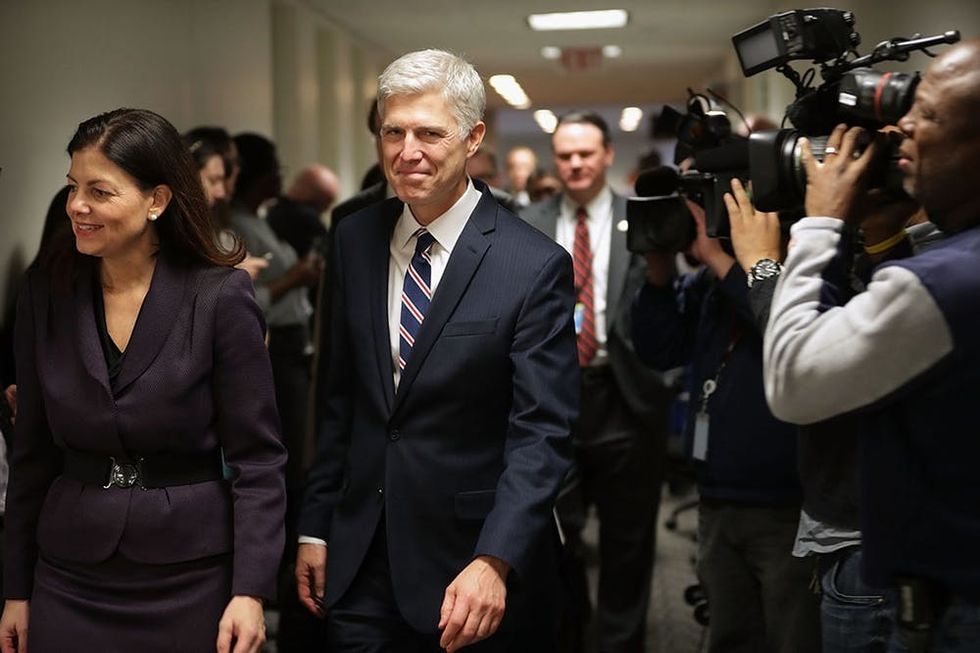This New SCOTUS Decision Will Hurt Women in the Workplace

The Supreme Court of the United States kicked off the new week by delivering a blow to workers. In a new decision, SCOTUS ruled to limit class action lawsuits against employers by employees, stipulating instead that workers must pursue lawsuits through individual arbitration. This is a serious blow to workers because it will force them to take up legal complaints on an individual basis instead of collectively through class-action lawsuits.

The ruling on the case means that employees who must sign arbitration agreements as a condition of their employment will not be able to participate in class-action lawsuits. Now, employers can effectively ban class-action lawsuits by forcing employees to sign one of these agreements in order to get a job. According to a 2017 report from the Economic Policy Institute, there are close to 25 million workers who had to sign arbitration agreements.
HuffPo reports that this decision will have major ramifications for workers — and especially for lower-wage workers —because class-action lawsuits have typically been the most effective way for employees to sue over issues related to minimum wage and over-time. Because the majority of minimum wage workers are women, this ruling will hit women earning lower wages hard.
In fact, the decision is already punishing low-wage earning women. HuffPo reports that one of the plaintiffs, a former employee of the oil and gas station company Murphy Oil named Sheila Hobson, claims she and other employees were required to work off the clock without pay. When Hobson and her former co-workers got together to sue their employer, a lawyer informed them that they wouldn’t be able to sue since they had signed arbitration agreements. Thanks to the SCOTUS decision, Hobson will not be able to pursue a class-action lawsuit to get the money Murphy Oil owes them.
But it’s not just potential class-action lawsuits over wages that will be thwarted by this decision. Class-action suits alleging sexual assault and harassment, too, will not be possible for workers who have signed arbitration agreements. In the wake of #MeToo, some companies, including Microsoft, Uber, and Lyft, have altered their forced arbitration policies. However, this still leaves a lot of employees vulnerable.

Technically, there is some chance the decision’s impact could be rolled back. Supreme Court justice Neil Gorsuch, who was nominated by president Trump and sided against workers in this case, wrote in the majority opinion that Congress could change this. “While Congress is of course always free to amend this judgment, we see nothing suggesting it did so in the NLRA — much less that it manifested a clear intention to displace the Arbitration Act. Because we can easily read Congress’s statutes to work in harmony, that is where our duty lies,” the opinion reads.
Unions can also help workers bargain with their employers for more rights and benefits, ranging from health care to arbitration policies and wages. As Emily Martin, the General Counsel and Vice President for Education and Workplace Justice at the NWLC told Brit + Co in a previous interview, “Workers are by definition dependent on employers for a paycheck and in a position of less power, which makes it really difficult to negotiate.” Unions can help put more negotiating power in the hands of workers.
But for now, the SCOTUS decision is a win for employees hoping to avoid lawsuits, and a loss for workers who may have otherwise been able to use collective power. In the #MeToo era and a time when workers rights are under increased attack, the five members of the Supreme Court who voted in favor of employers have clearly demonstrated whose interests they care about most.
What do you think? Tell us on Twitter @BritandCo.
(Images via Getty Images)

















